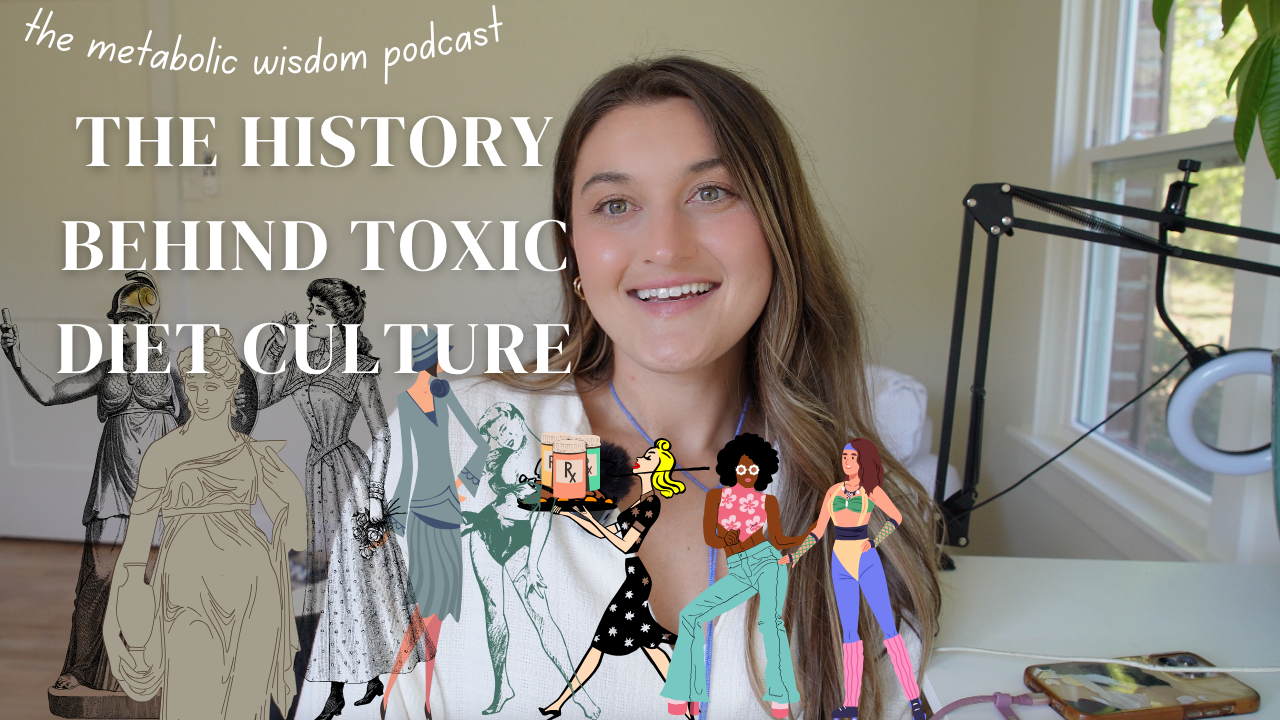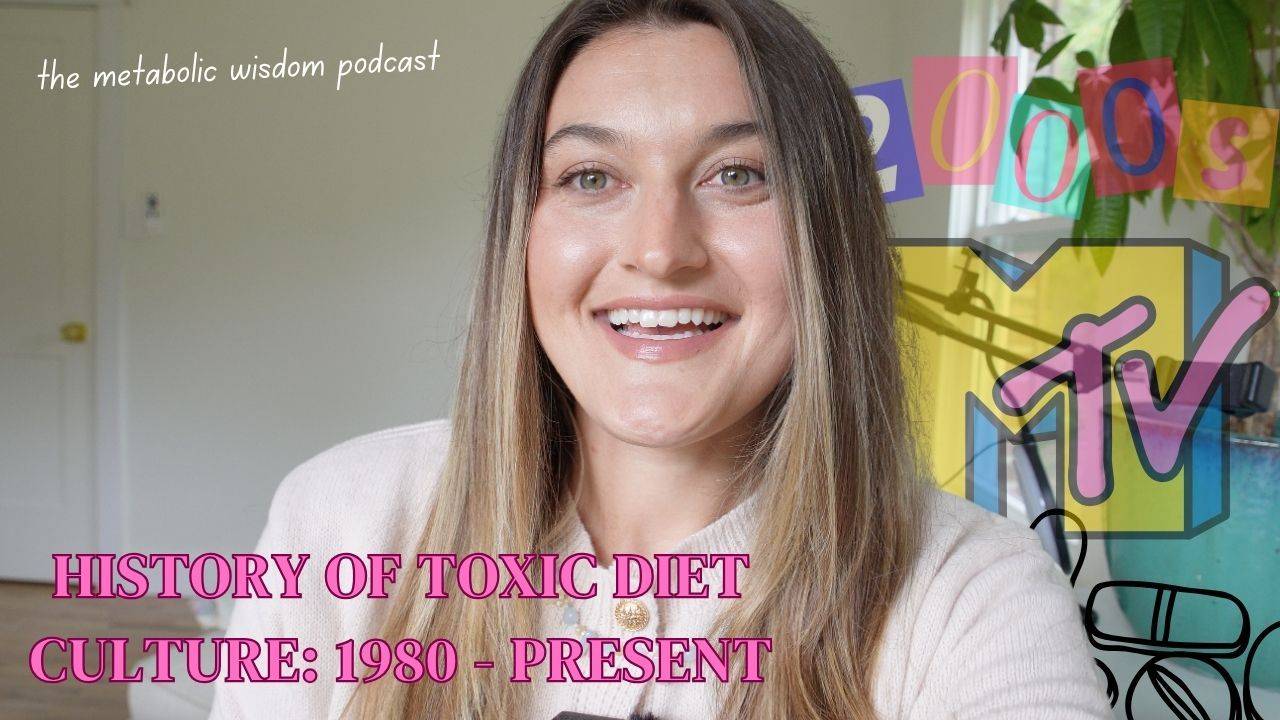The History of Toxic Diet Culture Part One (Greco-Roman - 1980s)

Episode Description
In this episode of the Metabolic Wisdom podcast, host Sara Childers delves into the historical roots of diet culture, exploring how women's bodies have been influenced by patriarchy, profits, and pseudoscience. From ancient fasting practices to Victorian ladylike eating, and the rise of diet pills in the 1950s, Sara uncovers the societal pressures that have shaped women's health and body image over the centuries.
Key Takeaways
- Diet culture's roots trace back to ancient Greco-Roman fasting practices.
Victorian era promoted ladylike eating, linking appetite to morality.
Fasting historically tied to spirituality and mental sharpness.
Diet culture often hijacks historical practices for profit.
Victorian corsets restricted both body and appetite.
Early 1900s media promoted thinness as a beauty standard.
1920s flapper era embraced boyish body shapes.
1950s diet pills linked to societal expectations of femininity.
1980s low-fat craze disrupted hormonal health.
Modern diet culture continues to echo past practices.
Episode Chapters
00:00:00 Introduction to Diet Culture
00:03:00 Ancient Fasting Practices
00:06:00 Victorian Era and Ladylike Eating
00:09:00 Rise of Diet Pills in the 1950s
00:12:00 1980s Low-Fat Craze
PODCAST TRANSCRIPT
Welcome to the Metabolic Wisdom podcast. My name is Sara Childers and I'm your host and today I'm talking all about how women's bodies have become the battlegrounds of patriarchy, prophets, and pseudoscience. We are talking all things history of toxic diet culture.
Introduction
I'm so excited because a lot of people think that diet culture started in the 1980s with the low fat craze, but in reality it goes back all the way to like Greco-Roman culture when societies and religions were getting together and fasting and you had this idea of morale and spirituality around your body. And so I'm going to take you through a history lesson today on diet culture and also a little bit about how toxic diet culture has destroyed our metabolism, our confidence, and our outlook on our bodies as women. Because I do believe that we are still in the dark ages of women's health where we have not yet come to a full realization of what our bodies need, what they want, because there's so much information out there and oftentimes we can experience analysis paralysis— whether it comes to diet or health, and it can be very overwhelming. So I think that knowing the history can actually help us to not let history repeat itself, but also to learn from history and to be able to look at diet culture with fresh eyes and to really see that it is a tale as old as time. Profits and patriarchy and pseudoscience has been around since the dawn of time and there's really nothing new under the sun. So I think that this will help with a little bit of discernment around diet culture and also what it's done to us as women.
Sara Childers (00:03.884)
So I guess we can go back and talk about fasting and antiquity. So in ancient Greece, people like Hippocrates and other philosophers really believed in fasting as a way to sharpen the mind, which it does scientifically. When we fast, our body goes into starvation mode sometimes and our cortisol increases.
And that makes our mind sharper because our mind wants to survive. We're in survival mode. We need to think sharply in case we need to run away from a bear or to create some sort of plan, escape plan. So our minds need to be sharp for this.
Sara Childers (00:51.031)
And as a Christian, I do believe in fasting as a way to get it more in tune with the spirit, get closer to God, to purify the soul.
show humility. And that's what a lot of ancient Christians did is incorporate fasting. And there's a lot of both Christian and non-Christian or more new age people who believe that patriarchy had a lot to do with this in early Christian times because a lot of the religious texts, a lot of the priest or all of the priest and all of the
main people in early Christianity were males and women and men respond to fasting much more differently. Women, when we get in survival mode, that lowers our fertility, it lowers our femininity, but for men it just sharpens the mind and it has a lot of benefits.
Sara Childers (02:08.162)
But fasting wasn't always about aesthetics or intermittent fasting. It was more about mortality, divinity, the mind. It was a vessel of discipline.
Sara Childers (02:25.602)
but it does kind of set the stage for self denial of food.
Sara Childers (02:36.286)
and it really does set the stage for virtue and control. But that actually, I think, gets hijacked by diet culture later on and gets turned into something that it's totally not.
Sara Childers (02:56.11)
So fast forward all the way to the 1800s, we have Victorian ladylike eating that kind of spurs on dieting, diet culture, and all of the things.
Sara Childers (03:15.471)
So in the 1800s in Victorian culture, it was an actual social expectation that women would not eat a lot of food, at least not in public.
Sara Childers (03:33.974)
Appetite was often tied to mortality and being ladylike meant not having a big appetite having a very delicate taste for food and also small portions
Sara Childers (03:56.81)
And doctors at this time actually told women that if they ate more, they would look less feminine and they would look more coarse.
Sara Childers (04:10.702)
unrefined. So eating less became a class status of refinement.
And that's also where you have like the corset. So women were wearing corsets.
Sara Childers (04:38.216)
And corsets were not just for fashion. They were also so that you would not eat a lot. Corsets restricted you and made you smaller in both body and appetite. And that's one of the main things that they were used for in Victorian culture.
Sara Childers (05:05.699)
And this era kind of set the stage for you eat less, you're more respected, you're more refined as a woman.
Sara Childers (05:19.406)
And now we're in the later, earlier 1800s, then 1830s to the 1850s, you had a lot of men saying a lot of, saying and doing a lot of things. You have Sylvester Graham, who was a Presbyterian minister. I'm Presbyterian. Um, but he preached temperance and vegetarianism, pure living.
to counteract the moral decay in industrialized America.
Sara Childers (06:02.574)
He believed that bland foods actually curbed your lustfulness and made you more virtuous. And he is actually what the graham cracker is made out of. is named after. Because he invented the graham cracker. Sylvester Graham.
Sara Childers (06:27.8)
So he framed food really for like moral purity and not just health.
But then later on in the 1800s, you have John Harvey Kellogg. If that sounds familiar to you, it's probably because it is. He is the Kellogg guy.
Sara Childers (06:51.618)
He also promoted vegetarianism and clean eating to promote health.
Sara Childers (07:07.47)
But he also believed that this suppressed sexuality and helped you to be a better person. And he did really set the groundwork for food as health too.
Sara Childers (07:29.112)
So this is kind of where you get good food versus bad food and diet being tied to your worth, your self-worth as a person and your self-control as a person.
Sara Childers (07:47.502)
So a lot of this has ties to the moralization of food. Most of the people that set the stage early on for virtue or sin, good and bad food, it was rooted in Christianity.
Gluttony is a sin.
Sara Childers (08:13.4)
So you have just this huge theme of your appetite and your mortality go hand in hand.
Sara Childers (08:29.442)
And I think that this is kind of like a direct ancestor of like cheat days and clean eating.
Sara Childers (08:40.066)
Pfft.
And as we're kind of going through the 1800s, you have this industrialization of society and also the rise of media.
Sara Childers (09:05.004)
And at this point you're having a mass production of cheap foods. at this time, it's early on that people are making these cheap, widespread foods. So you have the middle and the upper class actually kind of rebelling against that and having a health reform, so to speak.
Sara Childers (09:30.444)
and they are kind of turning natural and simple eating as a badge of your class association or your superiority to society.
Sara Childers (09:52.079)
And at this time you're finally getting like not only newspapers but magazines and you're getting women's magazines that actually are starting to show what the ideal body looks like because you have this middle and upper class kind of punch back to the mass production and industrialization of processed foods.
Sara Childers (10:21.11)
And that is actually when, in the mid, late 1800s, early 1900s is when you actually start to have the first like before and after diet photos in things like magazines to show like the superiority of this is what your figure should look like and kind of giving women a good baseline of what the beauty standard is.
Sara Childers (10:53.07)
And what's really funny is that in this time, like the 1890s to the early 1900s, you have a lot of ads for women and weight loss. There was even an ad I found about fat reducing soaps that promised to melt off fat from your body if you washed your body with this certain type of soap. It's crazy. But I thought that that was interesting.
Sara Childers (11:25.71)
But at this time, being overweight was being considered un-American, un-classy, lazy, undesirable. And that's what's being put in these magazines and in this mass media.
Sara Childers (11:52.824)
You just have this big pressure of...
this new emerging mass food production and also the people that don't want you to eat all that food.
Sara Childers (12:14.51)
Can you hear what I'm
Oh, because I feel like I'm just spitting out good stuff. I'm going through. Oh, wait, I don't need to talk because my mic's on. Because what? I don't need to talk because my mic is on.
Sara Childers (12:45.966)
play Walmart.
Sara Childers (13:16.27)
So we've gone through Greco-Roman culture, 1800s, early 1900s, now we're in the 1920s and the 1930s. So you have flappers and cigarettes, flappers and cigs. This is kind of like body type wise, this is when the boyish shape, so not really having curves, the drop waist.
silhouettes. We're really in style.
Sara Childers (13:58.744)
But this is when women are getting a little bit more in their masculine era because the suffrage movement had gotten the vote in the 1920s and women were entering into the workforce.
Sara Childers (14:16.95)
And being modern was like really aesthetic at this point.
Sara Childers (14:28.426)
And so the flapper ideal is like kind of going back to like that boyish finger. You have like slim hips, drop waist, flat chest, long straight lines, adolescent looking is what was in style for the body type of that era.
So you had bust minimizers, body binding up under garments to just make everything go together, bandeau bras to flatten the chest and flatten the curves.
Sara Childers (15:12.694)
And a lot of diet books at this time recommended to women that they skip meals and that they cut the bread and butter to have that more boyish look.
Sara Childers (15:27.34)
And at this time, like there was an underlying cultural meaning to it because they had done away with the corsets. So they didn't want to have those curves any longer because they were modern woman doing modern things.
Sara Childers (15:51.082)
And this is kind of also the first time where like being thin was not just for the middle and upper class. It was a societal like desire to be thin.
Sara Childers (16:10.26)
and that's kind of where you have like that starvation and that scientific slimming.
Sara Childers (16:18.902)
Reducing salons are actually a term and they popped up in cities. So these were actual places that women went to that offered things like electrical massages, sweat boxes, and vibrating belts to shake off the fat. And does that not sound familiar? Like we have...
places popping up, which I love sauna and stuff, but we have places with like sauna to shed the fat and even like now we have those waist trainers to make you sweat more and vibration plates to help with lymphatic flow and although there's more science behind it, it just doesn't sound all that different. So there were actual reducing salons that were made to make women skinnier.
Sara Childers (17:13.016)
And that's when you kind of also have like the scientific approach to dieting come into play. That's when people started counting calories and stuff.
Sara Childers (17:23.92)
And women would literally eat things like...
reducing pills.
Sara Childers (17:33.986)
that contained thyroid extract and laxatives to speed up the weight loss so that you would be using the bathroom all day so you'd never get bloated. And also it would speed up your thyroid to ideally like speed up the metabolism. Kind of going with that scientific approach here.
Sara Childers (17:59.288)
So chronic undernourishment started to kind of come up as, they have dys...
And it really set the stage for a lot of eating disorders to start because of the recommendations to skip meals, go to reducing salons, chronically take laxatives, which is actually eating a lot and then either taking laxatives or purging or whatnot is heavily tied to binge eating disorder. And I should have done a disclaimer at the beginning of this episode, but this is now your disclaimer.
If you have an eating disorder or get triggered by any of these things, please don't listen to this podcast. This is not for you.
Sara Childers (18:51.022)
And I'm not done with the 1920s though. This is not even the tip of the iceberg. We still have smoking as an appetite suppressant in the 1920s and the 1930s.
Sara Childers (19:07.416)
There was a slogan in a media ad that said, reach for lucky instead of sweet, which basically meant lucky strike cigarettes in the 1920s. That was their ad to reach for the lucky strike cigarettes instead of reaching for a sweet treat in order to stay skinny.
Sara Childers (19:34.262)
And what's actually very interesting about this is that Lucky Strike hired an actor for their media production for this ad. His name was Edward Bernays and he was actually Sigmund Freud's nephew.
and they hired him to market the cigarettes to women.
Sara Childers (19:59.576)
Cigarettes at that point were not only like a slimness tool, but they were also like a sign of independence because at this point women are wanting their independence and women are wanting to break free from the shackles that they've always had, patriarchy, blah, blah.
Sara Childers (20:32.824)
So this is before lung cancer risks were widely publicized. So you had women in very, very, very large amounts smoking a lot.
Sara Childers (20:51.618)
And all this together, the smoking to suppress your appetite, skipping meals, go to things like salons, like calorie counting, restricting, this created disordered eating and undernourishment, which can lead to things like amnuria, which is like loss of periods. So women are likely less fertile at this time. Hypothyroidism and a slowed down metabolism from constant restriction, because yes.
Hypothyroidism can be caused by chronic dieting and just all over like poor, poor, poor, poor nutrition, calcium depletion, immune suppression, all the things.
Sara Childers (21:49.74)
And doesn't this just sound like things we still struggle with? Like this skinny tease, the appetite suppressing gummies don't even get me started on Ozimbic, we'll cover that later. yeah, nothing's changed. And if you look at history, you can see how it affected the women. But in reality, in present day, it's really hard for us to accept that it could also be happening to us.
Sara Childers (22:24.12)
So we've gone through all of those decades. Now we're to the 50s and the 60s, which is Housewives, Hollywood, and diet pills.
Sara Childers (22:39.032)
So this is like the post-war beauty ideal, which is thin, still, polished, but submissive. So you have like your housewife, we went through World War II society, of pressured women back in those more domestic roles, which I personally don't have a problem with. Rosie the reveteer was retired.
And we're thinking like slim waist, smooth curves, hair all in place, lipstick on at dinner, just not too many curves, just controlled, very controlled and polished. We've all seen a 1950s housewife and thought, yeah, the pearls, all the things.
Sara Childers (23:39.776)
And the icons at this point were people like Grace Kelly, Dora Day, and later on in the UK you have Twiggy, which I'm like, okay, people always talk about like really skinny people and they're like, you're a twig. I'm like, is it because of like the branch or is it because of Twiggy?
Sara Childers (24:05.048)
So femininity at this point meant, again, discipline.
thinness, now pleasantness to be around because post-war you want to be a safe place to land.
Sara Childers (24:23.842)
Weight loss was highly linked to like marriageability, keeping your husband happy, and also just social status. So middle to upper class.
Sara Childers (24:44.204)
And this is also when amphetamines were the diet drug of choice.
These were doctor just prescribed magic pills or miracle pills, excuse me. And can you see, like, can you see that like it all starts with what doctors say? I digress.
Sara Childers (25:12.674)
These were brand names like Obatrol later known as Adderall, which Adderall arguably is very adjacent to cocaine.
Sara Childers (25:29.304)
but they are at the time marketed as safe, marketed as like weight control.
Sara Childers (25:46.7)
And they were handed out like candy to women alongside the barbiturates. I think that's how you say it. The uppers and lower cocktails. So they were uppers and downers that were like cocktail together and given to women along with like these Adderall-like supplements to kind of keep them controlled so that they'd stay skinny.
Sara Childers (26:13.878)
and they were marketed to as like, not only do they control your appetite, but they give you more energy for that woman chasing around her kids wanting to keep a clean household and who has a lot of chores and wants to keep a spotless home, got a lot of cooking and cleaning to do. So a lot of like cultural validation.
Sara Childers (26:40.012)
And I thought that this was interesting. This says, women didn't feel like addicts and they were simply following doctor's orders to stay slim, productive and desirable. And I think that this is probably like the most influential on our present day like diet culture and outlook than almost anything else we've talked about so far is.
Sara Childers (27:13.058)
but this is where like stimulating diets were normalized.
Sara Childers (27:25.652)
Most diet plans at this point included a prescription to go along with it.
Sara Childers (27:38.498)
But at this point, women are becoming chemically dependent without even realizing it.
Sara Childers (27:53.422)
And this is where you have like an influx of thyroid suppression and also really stressed adrenals because when you are having uppers and stimulants all the time, your adrenals are on overdrive creating adrenaline, cortisol, and all of the hormones that you need in order to survive in survival mode.
Sara Childers (28:24.378)
And not to mention all of these prescriptions even now show to have a lot of influence on mood stability. Oftentimes blood sugar and adrenal fatigue go along hand in hand. And again, we have the anamnuria of the starving woman who has missed periods because her body's in survival mode and that decreases fertility. So we just see this even go deeper and deeper and deeper than it even was
before.
Sara Childers (29:01.71)
And this is where you actually also in the 1950s and 60s see a rise in mental health disorders. So a lot of anxiety, paranoia, depression occurred when these stimulants wore off.
Sara Childers (29:25.848)
So they go into this dependency cycle, pills to wake them up and suppress their appetite. And then they took sedatives at night in order to sleep when the pills were off and they started to have that anxiousness and that paranoia and that depression.
Sara Childers (29:50.732)
and that's where you have Mother's Little Helper, can't even speak today, that's where you have Mother's Little Helper Valium come into play. That's like how it was marketed. That's how it fit into the cycle.
Sara Childers (30:13.42)
And this is sadly also where you have a lot of these 50s and 60s household mothers passing this on to their daughters. This toxic toxic cycle of science and self denial equals beauty and belonging. Like if you use science and self denial and restrict yourself and have just like this self abuse, you will be beautiful. Pain is beauty.
you will be beautiful and you'll have belonging and you'll be marriageable, you'll keep your husband happy. Like all of these honestly lies and as a Christian I really just want to be like lies from the devil, strength from the devil and I think if you're a Christian you would probably agree but this is this is an actual huge phenomenon and I do actually think that there is a lot of even spiritual warfare at this time like when
Women are getting to the point of being dependent on drugs in order to function day to day and to keep up with their roles.
Sara Childers (31:31.522)
And you see in the 1960s, the amphetamine addiction becomes actually noticeable.
And that's where you have like the 1970s releasing new fads, like the grapefruit diet, Weight Watchers, aerobics culture.
Sara Childers (32:19.872)
the scars still diet. This is where you see actual diet culture come into play in the 1970s because in the 1960s you start to see the poor effects of the cycle that the women in the last two decades have went through with all of these prescriptions. And in the seventies you kind of have like that holistic like, yeah, we'll be holistic like Woodstock vibe type of thing.
Sara Childers (32:56.888)
So drugs were being regulated because of the abuse. So we have to turn to something. We turn to what is called the Hollywood diet, which is the grapefruit diet in the 70s.
Sara Childers (33:10.252)
And this comes from the claim that some doctor had that grapefruit had like fat burning enzymes in it.
Sara Childers (33:24.117)
and they promoted that you eat half a grapefruit at every meal, maybe even instead of a meal, only eating like 800 to 1000 calories a day in order to lose weight. And what's crazy to me is I remember when I was in high school, people still did this. People still thought this was the answer and that's just absolutely bonkers to me.
Sara Childers (33:51.059)
And since this at the time in the 70s was really popular in Hollywood culture, it was glamorized.
Sara Childers (34:07.406)
And then after the grapefruit diet, you you have the scars still diet, which is from Dr. Herman turnover in the 19th and 1978. think, um, this is when this doctor really pushed high protein, ultra low carb diets, which is hilarious. Cause like, here we are 40 years later and nothing's changed.
This was like a strict 14 day rotation, only about a thousand calories a day, which I have a lot of clients who eat a thousand calories or less a day when they come in to see me because they have tried to follow diets like this in present day.
Sara Childers (34:53.251)
and it was marketed medically as safe because it was from a doctor and that's who everybody trusts.
Sara Childers (35:02.508)
but it had a lot of backlash with it and obviously it was not stable. But then you have other diets too, like kind of come and go at this point, like the cabbage soup diet, which is unlimited portions of cabbage soup and then tiny portions of like meats and fruits. And that just kind of led to extreme bloating.
and nutrient deficiencies because cabbage is great but it's not super nutrient dense and also like that influx of fiber and nothing else like sometimes can be too much for people.
And then you can't forget the rise of the meal replacement drink, the liquid protein diet.
Sara Childers (36:00.426)
And these were like collagen-based drinks, really poor nutrition, nothing else added to them, but they did have the protein with it.
Sara Childers (36:10.474)
And this is this liquid diet by the late seventies was actually like caused dozens of deaths due to cardiac arrest. So having a liquid protein diet, a meal replacement, collagen drink with little nutrient in it, and that just being all that women had led to literal cardiac arrest and killing dozens of women. And I just think it's so crazy because these
These few diets in the 70s, I still see today as a dietitian. And it's just ridiculous because diet culture has confused us that much.
Sara Childers (36:54.616)
So, past the 1970s you have the 1980s, which is where we have Jane Fonda, Queen, and aerobic exercise culture.
Sara Childers (37:11.47)
Jane Fonda actually began writing books and having classes in the late 70s but in 1982 is when her first workout aerobic video came out.
So this is where you have like the non-starp cardio, neon leotards.
calories burned being like a metric of how much you're worth as a person like all the crazy things a crazy hair of the 80s all of it
Sara Childers (37:47.298)
But this is also where you have like a metric shift of like food equals guilt at this point.
Sara Childers (37:59.232)
And then exercise was like kind of you repaying your debt because you ate food. And so it's like exercise is punishment for you doing something wrong, you eating food. You're a bad person because you ate something kind of thing.
Sara Childers (38:17.922)
And this is where gyms and at-home workouts are now like exploding with popularity in the 1980s.
Sara Childers (38:28.674)
and for the first time exercise is like becoming mainstream for women.
Sara Childers (38:36.886)
and it's almost entirely framed around body shrinking. So the narrative, the plot has not changed that much.
Sara Childers (38:49.184)
And so, you know, we're no longer at this point told to diet. We're told to sweat off your sins.
Sara Childers (39:12.255)
And you know at this point if you weren't dieting you were letting go of yourself. And so there's a huge cycle of like restriction and rebounding. Restriction, rebounding.
Sara Childers (39:27.096)
So let's talk about all of the issues with the diets that we've talked about thus far going from 1800s all the way to the 1980s. So you have gut health, thyroid damage, adrenal stress, extreme diets. You know, they really do limit biodiversity, fiber, nutrients, and over restriction just destroys the gut too much.
and liquid diets especially that were high protein, low carbohydrate, low nutrient really starve the good gut bacteria. And then you have that restriction and then also mixed with like the fatty-ism of exercise and going to the gym and exercise videos. You have like an increase in cortisol most likely because you're...
not having anything to fuel your workouts and so your body's in starvation mode that slows down the thyroid that suppresses the thyroid and overworks the adrenals so we have adrenal fatigue from over stressing and if you your adrenals are fatigued like your progesterone which is your main good female hormone and your testosterone will plummet so this is where you have like so many women who are now like in their
50s and 60s and maybe even 70s who have such horrible metabolisms and it's because they were restricted in the prime of their life when they could have been building up their nutrient stores and building up their bodies. They were just restricting and punishing themselves for fueling their own bodies.
And there's so many people I meet that are kind of from this generation of dieting that I believe have an actual eating disorder, but a lot of people don't consider themselves like having eating disorders if this is something they've done for decades and something they've been conditioned to do. And I think now you more so expect someone young like.
Sara Childers (41:45.058)
in their teens or early twenties to have an eating disorder and you never really suspect that the mother, grandmother, matriarch, what's supposed to be the woman of wisdom in a family would have these really deep, corroded beliefs around body, body image and beauty, but it's definitely a thing and it's...
You're actually pressed to find a woman who has made it through the 1980s and maybe the 1972 who doesn't have these corroded views of women's bodies and how you should nourish yourself and how you should treat your body and exercise for punishment and that transactional look on women's health.
Sara Childers (42:39.342)
Because in the 1970s, you have not only the food part of it, but you have the exercise part of it now. So exercise always increases weight loss. So at this point in the 1970s and 80s, you see this obsession with really fast, short-term weight loss that's very unsustainable and very unnatural.
and very just unhealthy for the body.
Sara Childers (43:27.938)
And that has all set the stage for the 1980s, the low fat revolution that not only spread through diet culture, but even through big food, where now that's why we have so many low fat options in the grocery store. It completely took the food industry by storm. And that really wrecked a lot of our hormones because
What people don't realize is that your hormones are made from cholesterol and cholesterol is fat, especially saturated fat. And so when you restrict fat and when you restrict the very thing your body needs in order to make hormones, guess what? You're not going to make hormones because you don't have the materials, the raw materials to make the hormones. So that's where we see just this huge disconnect of what nourishes us.
versus what doesn't. And even still, we still see like as dieticians, as nutritionists and health professionals, we still see so many people demonizing fats and doing low fat this, low fat that. You still see it in like bodybuilding culture and just weight loss culture in general, because fat has calories and God forbid we give our body calories that it needs.
So it's really interesting and the thing about all of this is that all of these fad diets and all of these crazy restrictive diets actually destroy the metabolism. It actually destroys the one thing you want to be good, which is your metabolism, the amount or the rate in which you burn fuel, burn calories at rest or in general throughout your day.
And so that is why you see, think personally, so many women now who are entering in, maybe they were in their twenties in the 1980s or maybe they were in their teens or, or whatnot. And you see that they go through this stage where they have horrible menopause symptoms. have horrible, metabolisms later on in life.
Sara Childers (45:49.094)
And this is why, because of the deep lies that have been told to us by diet culture and the imaginary powers that be that tell us what our bodies should look like and how we should function and how we should go through the world and how women can be beautiful and belong, which is our innate desire as women. So I think this is really important to think about. And I'm gonna stop here at the 1980s.
And I'm gonna pick up in my next podcast on the 1990s all the way to present day because there's a lot to uncover there and a lot to unpack but I hope you found this episode entertaining and enlightening. If you did please comment, like and subscribe and if you're interested in working with me one-on-one in my container Fully Feminine which is a 16-week four-month program
where we work one-on-one together to tailor your nutrition, your supplementation to meet your needs and to fill the gaps in your diet based off of functional medicine testing. I would love to work with you. So go to my website, sarahchildrensnutrition.com and learn more about that and book a discovery call there. And until next time, have a good one. Bye.






